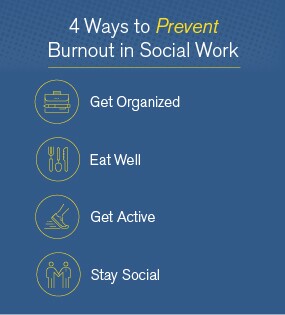How Social Workers Can Stay Physically and Emotionally Energized

Burnout isn't uncommon within high-stress fields. Careers that are emotionally or physically intense can wear a person out and create a situation in which they no longer feel like themselves. When someone is burned out, they may not even be able to take on their normal responsibilities, or at least not work to their full potential. This can become a particularly problematic reality when social workers burn out.
Social work burnout seems particularly common. While this is a career associated with serving others and impacting the world in a meaningful way, it's also incredibly demanding. It can put a professional through significant mental and physical strain while also requiring a considerable investment of time and effort.
So how do social workers avoid burnout and handle the intensity of their work? Below, we've outlined four lifestyle habits that can help social workers deal with stress and stay burnout free.
1. Get Organized
No matter what area of social work an individual is focused in—whether family services, community corrections or military personnel support—there is always a lot going on at once, with many tasks to keep track of. Staying organized within such a fast-paced and high stakes environment can be extremely difficult, but it is critical to do so.
Studies have shown that having an unorganized work life and workspace can greatly increase a worker's stress.1 Of course, everyone operates differently, so there is no single approach to effective organization. Figure out how to organize your physical workspace and also how to prioritize current and upcoming tasks, and you will likely go a long way toward reducing your stress levels.
2. Eat Well
It's generally understood that eating well can have positive benefits for physical and mental health. But while we know this to be true, choosing to eat healthy can still be a difficult task for many people—especially those working in fast-paced and demanding jobs. At the end of a long and emotionally taxing day, while a nutritious meal could actually make a person feel better, it's usually simpler, and oftentimes more immediately gratifying, to indulge in less healthy foods. That's usually when people turn to fast food and highly processed or sugary food.
Professionals in the field of social work need all the energy they can get. While comfort foods may seem to help temporarily with stress or work-related anxiety, in the long run they are far from the best choices and can eventually slow you down. Go-to comfort foods are often high in sugar and low on nutritional density, neither of which is ideal. Avoiding these in favor of healthier options like fruits, vegetables and other foods that are high in fiber can help overtaxed social workers increase their energy levels and reduce fatigue and anxiety.2
3. Get Active
Social workers often work long hours, which means it can be difficult to make time for workouts or other physical activity. But once again, the more challenging choice is often the best one for us. Making the time to exercise, even when you're exhausted at the end of a long day, can be critical in preventing burnout. Regular exercise has a proven ability to stabilize mood, decrease anxiety and increase energy levels. It's also proven to enhance concentration and allow for easier, more restful sleep—useful qualities for any busy social worker.3
4. Stay Social
For anyone who suspects they are nearing the point of burnout, it's important to have someone to talk to about it—or to talk to about anything, really. Being social and keeping yourself connected to others can ensure you have a way to share and release what may be pent up emotions, and it also reminds you that you're not alone. Staying engaged with those who care about you, or who understand your position and its demands, can have great benefits in reducing overall stress levels.4
It's All Good
For social workers, it's important to remember that in order to provide the best care to the communities and individuals you work with, you need to first care for yourself. That means being physically energized, mentally focused, organized and emotionally well-balanced. If you do start feeling burned out, take a step back, analyze your present circumstance and determine what action you can take to halt unwelcome stress.
Want to learn more? Find out about the online Master of Social Work from the Wurzweiler School of Social Work at Yeshiva University by contacting an Admissions Advisor today at 866-545-9506.
- Retrieved March 30, 2018, from business.time.com/2014/01/22/5-scientifically-proven-ways-to-reduce-stress-at-work/
- Retrieved on March 30, 2018, from pcrm.org/health/health-topics/how-to-eat-right-to-reduce-stress
- Retrieved on March 30, 2018, from adaa.org/understanding-anxiety/related-illnesses/other-related-conditions/stress/physical-activity-reduces-st#
- Retrieved on March 30, 2018, from mswguide.org/blog/how-to-prevent-social-work-burnout/
